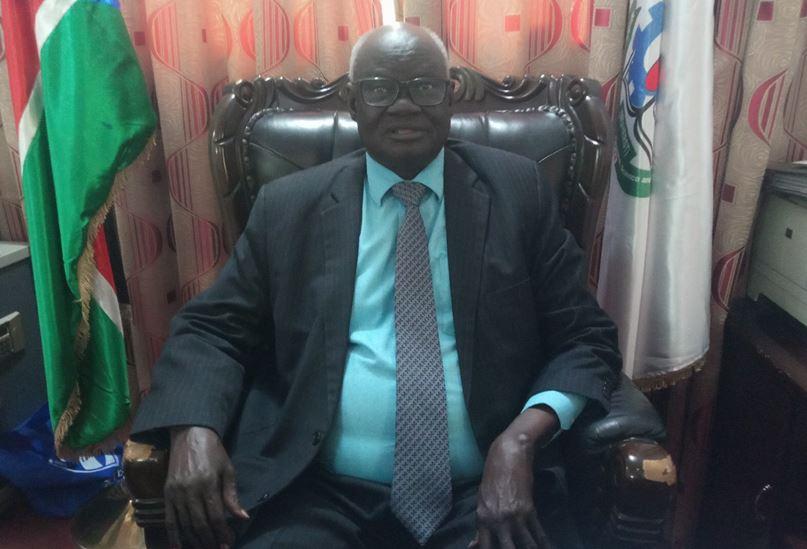Africa-Press – South-Sudan. The Ministry of Higher Education, Science and Technology has revealed that it has adopted a new policy to fairly award foreign scholarships to South Sudanese nationals due to corruption and nepotism allegations that have marred the ministry in the past, although the public is yet to trust the policy.
Earlier this year, an allegation surfaced that about 10 out of 50 scholarships from the Kingdom of Saudi Arabia were awarded to a close family of one of the senior government officials, in what appears to be a scandal.
The move made the public question the reliability of the foreign scholarships for vulnerable and struggling students with no officials to facilitate their processes.
Gabriel Changson Chang, the Minister of Higher Education, Science and Technology, admitted the claim and said that his ministry had to introduce a new policy that decentralised scholarships in a bid to curb such incidences.
“It is one of the reasons why we changed from that old system of awarding scholarships, which was based on merit, to the new system where we have decentralised the scholarships to the states and the administrative areas,” he explained in an exclusive interview with The City Review on Tuesday.
The minister added that all the 10 states and three administrative areas would now enjoy the dividends, as many had been deprived in the past when the selection criteria was centralised.
“When I came in, scholarships were distributed based on merits, especially the highest grade. As a result, even if you were to come from one state or one family; you can qualify to go for those scholarships, but in our new policy; we said no, as part of our reforms in the ministry; we have to look at the bigger picture,” Changson disclosed.
“And the bigger picture is South Sudan; so, if we are given scholarships by our friendly countries, then we have to use those opportunities to help our people in the broader manner, “the minister added.
In July 2021, it was alleged that Ruweng Administrative Area scholarships for admission to Ethiopia for 2021/2022 were awarded to Unity State students. This also followed a claim that most of the scholarships in South Sudan were awarded to the close relatives of senior government officials.
Nevertheless, Mr. Changson acknowledged that the three administrative areas and the 10 states were deprived of their rights and that the new policy would now help them without compromise.
“We have shifted the competitive from general competition to state competition, not only the state but county competitions, and this is healthier than centralising the scholarships,” he stated.
“So, the policy is that we distribute the scholarships by the 10 states and the 3 administrative areas so that they all get the opportunity to benefit from those scholarships,” Changson reiterated.
Roots to implementation
The minister pronounced that they have already started implementing the new policy of awarding scholarships as per the states and administrative areas.
“This policy is now working. We have implemented it for Ethiopians’ scholarships twice, in , Egypt, Sudan and in Saudia Arabia, so we are in the implementing zone,” Changson revealed. He however disclosed that the Pibor, Ruweng, and Abyei administrative areas were also getting their fair shares.
“Now, we have about 500 scholarships to Sudan, which we are still finalising the distribution, but one state will have about 30 students and the administrative areas with about 10 or 9; so, this is how we are implementing the policy,” Changson confessed.
Gender representationChangson said the policy also reflects elements of gender representation as enshrined in the revitalised peace accord.
“We also say, since we are also trying to give fair chances to all, then we have to implement the 35 per cent which we have agreed to in the agreement for both girls and women,”
“So, if there are 30 scholarships given to maybe Central Equatoria, at least 10 must be girls, and this policy must be implemented,” According to the minister, it was imperative for those who did not have their chances before to get such chances now.
“I think this is good for all of us because we are a nation; we are people. We have to see ourselves in that mirror of South Sudan,” he stated.
Retaliation
Martin Wang, a concerned South Sudanese national, argued that the ministry has instead transferred the malpractices to the states level. “There is nothing much that they have done; this is another way of transferring the corruption to the state level,” he noted.
“If it has been taken to the state like the minister said, then it is still the same rampant corruption that will be undertaken by the state officials. They will bring their relatives and children to such positions, and the mess will continue, “the young professional added.
A senior lecturer at the University of Juba’s School of Public Service who preferred anonymity on the matter stated that unless higher education adopts a technical know-how method of selection, corruption practises in awarding foreign scholarships in South Sudan will continue.
“The strategy is that they (Ministry of Higher Education) have to embark on technical know-how term of selection. The scholarships should be advertised online for students so that they try their luck, and it is scrutinised by the funding authorities.
“It should be online guided by the respective country embassy in South Sudan,” he added. The lecturer believes that the scholarship would only be free from corruption and nepotism when they are advertised on professional platforms.
“After such a strategy is employed, the Higher Education have to generate a technical committee from the public institutions of learning to guide the process and work closely with the funding authorities,” he urged.
According to the lecturer, the committee should be independent, impartial and technical by all means. According to the academic, the scholarships were not trusted currently since some of the officials controlling the opportunities were not free from corruption and nepotism. According to other locals, the decentralised system has affected internal recruitments of workforce across the country
Decision intact
Though some of the citizens doubt whether the policy would yield fruits, the Minister insisted that it was the best move ever. He continued that the execution would be monitored to track its transparency and reliability.
“When we give the state a number of scholarships, we also made it more tighten in their activities in the sense that in our form; there is the state, county and the Payam (sub-county),” Changson said.
“If the scholarships are not covering all the counties in the state, then it means that we keep track record of those counties which benefited from any scholarship that time, and then next time we give priority to the other counties, and we trace the transparency then,” he disclosed.
According to the Minister, they would continuously look at the loopholes and see how to get rid of them “We will look into it by all means, you see when there are shortcomings or loopholes in the policies, you have to tighten the control, so that they don’t happen,” he concluded.
South Sudan’s education indicators are among the worst in the world due to protracted conflicts and underfunding by the government, according to agencies. Several reports indicate that South Sudan has got the least illiterate rate since most of the people are out of schools, mostly young girls.
For More News And Analysis About South-Sudan Follow Africa-Press






